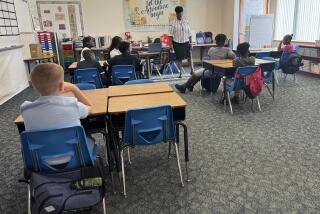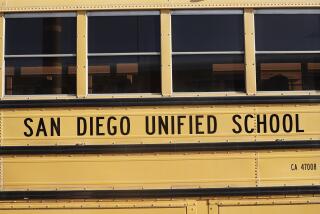Approval of Remedial Program Fails to Satisfy Leaders of Private Schools
Hoping to appease state, federal and Catholic school officials, San Diego school trustees Tuesday approved a series of improvements to their controversial remedial education program for private-school students from low-income families.
But the changes were immediately condemned as “unacceptable” by the principal of a large city parochial school, who said he hoped that state and federal investigators who have reviewed the city’s program would also reject them.
The debate at Tuesday’s Board of Education meeting indicated that there is no solution in sight to the eight-month battle between public and private school leaders over remedial math and reading lessons provided by the school district.
Federal law requires the district to offer the services to 1,243 private school students, but the U.S. Supreme Court ruled last year that public school teachers cannot enter private schools to do it. After months of discussion, city school leaders decided to offer the instruction on school buses converted to classrooms and parked outside private schools.
The program triggered complaints to state and federal education officials from Catholic school leaders, who said the buses were inadequate for educational purposes and that most of their students were receiving no instruction. Twelve of the 15 private schools involved are Catholic schools.
In a March 26 report, the state Department of Education agreed, finding the school district guilty of violating federal laws by failing to provide private school students from low-income families with the same remedial education it offers its own students. Federal investigators conducted a review two weeks ago but have not yet issued a decision. Federal officials could ultimately take the program away from the district.
The modifications offered Tuesday were the district’s attempt to meet the state’s April 25 deadline for improvements. The district said it would teach youngsters from two Catholic schools at nearby public schools; provide more training for public and private school teachers; soundproof noisy generators on the buses; install two-way radios that will be monitored by school police; add storage cabinets in buses and private schools, and provide more room in the buses by serving fewer students at a time.
By today, “mobile classrooms” will be at eight schools, serving 75% of the children eligible for instruction, said Bertha Pendleton, special assistant to Supt. Thomas Payzant. A mobile lending library will be provided at schools where classrooms are not yet available.
“We believe that it does represent a very responsible response,” Pendleton said.
But Richard Scherer, principal of Our Lady’s School in Golden Hill, said that 120 of his students would have to walk 11 minutes each way to and from Sherman Elementary School for their lessons, crossing traffic and braving an unsafe neighborhood. Over the course of a school year, they would lose three weeks of instruction, he said.
“I can’t for the life of me see you approving a plan for a public school site that would allow students to be out of school for three weeks, walking,” Scherer told the Board of Education.
Scherer dismissed the district’s plan as “more promises” that will not be fulfilled. “We’re quite convinced that the state and federal investigators will find it unacceptable,” he said.
The Catholic schools want the district to install portable classrooms at their schools, a move the district has refused to adopt despite assurances from state and federal officials that the move is legal.
Board member Kay Davis told Scherer that “I think we’re trying to do the best we can under the constraints.” Payzant, who recently returned from a conference of big-city school superintendents, said that school districts across the country have negotiated solutions to the conflict that include the use of mobile classrooms and teaching private-school students at nearby public schools.
He said he believed that federal officials would approve the plan.
Gary Jensen, vice president of the San Diego chapter of Americans United for Separation of Church and State, voiced strong support for the plan, which the board approved by a 4-0 vote.
“You people have gone the second, third, fourth and fifth mile,” he said.
More to Read
Sign up for Essential California
The most important California stories and recommendations in your inbox every morning.
You may occasionally receive promotional content from the Los Angeles Times.










